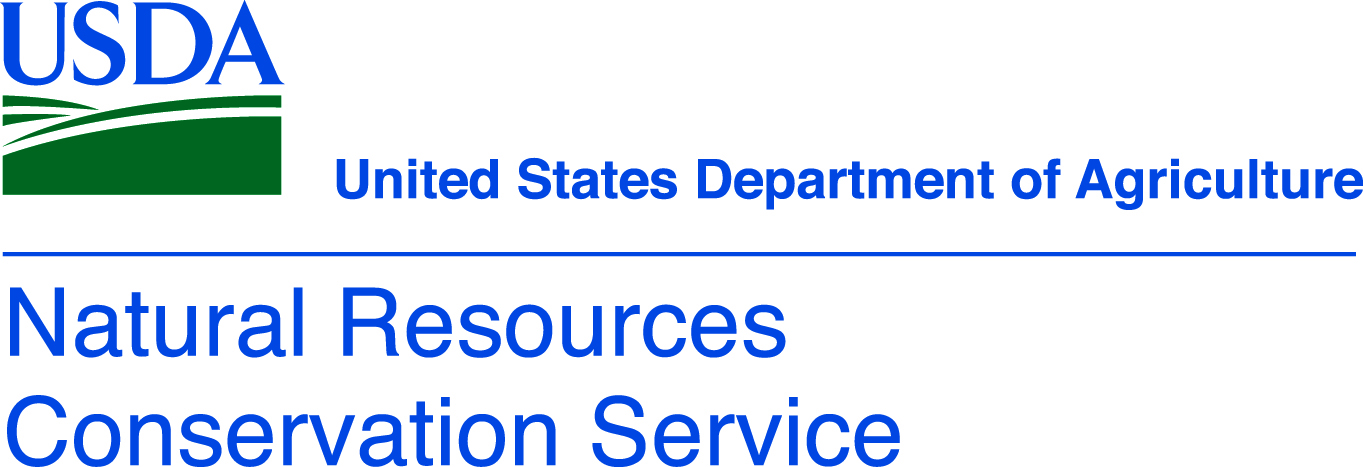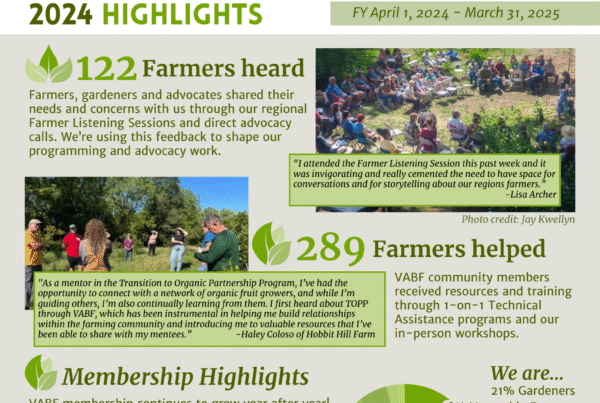Current USDA and State (VA) Program Opportunities
This will become a new “regular feature” in the monthly VABF e-newsletter. Its goal is to keep you informed of currently-open signup-periods for NRCS conservation and other programs of interest, and Requests for Applications for USDA research, training and outreach, and local food systems programs. Links to more detailed info and application procedures will be provided.
The more we use these programs, the greater our leverage in advocating for expanded federal support for sustainable agriculture, conservation, family farms, food sovereignty, and climate mitigation and resilience in future Farm Bills.
Note: because this column is starting in the middle of signup periods, some deadlines are very tight. This should improve in the future as new programs open and are promptly announced. Three NIFA programs have released their 2020 RFAs early (listed here), in anticipation of the disruption caused by relocation (more below).
Continuous Conservation Reserve Program (CCRP): financial support for putting part of a field into a long term conservation planting – great for protecting a stream or providing wildlife habitat along the least-productive or most erosion-prone part of a field. Signup closes Aug 23.
Conservation Reserve Program Transition Incentives Program (CRP-TIP): if you have an expiring Conservation Reserve Program (CRP) contract, and you transition management of the land to a beginning, socially disadvantaged, or veteran farmer who will implement sustainable or organic practices, you can receive two additional years’ CRP payments after transition.
Signup closes Aug 23. More at http://sustainableagriculture.net/blog/deadline-to-enroll-in-continuous-crp-or-transition-incentives-program/.
Southern SARE Professional Development Program (PDP) funds projects to train Extension and other agricultural service providers in sustainable production systems. Non-profits and community based organizations are eligible to apply. Request for pre-proposals due Aug. 30.
Beginning Farmer and Rancher Development Program (BFRDP) RFA for 2020 open through Feb 13, 2020. http://sustainableagriculture.net/blog/14-million-available-to-help-train-the-next-generation-of-farmers/.
Agriculture and Food Research Initiative (AFRI) Foundational grants. RFA for 2020 open through March 19. http://sustainableagriculture.net/blog/afri-foundational-rfa/.
Organic Research and Extension Initiative (OREI). RFA for 2020 open through January 23. http://sustainableagriculture.net/blog/fy2010-fy2020-orei-rfa/.
Virginia Agricultural Best Management Practices Cost-Share Program, initially announced in July newsletter. Funding available until exhausted or until June, 2020.
Priority Action: Promoting Local Food in Public and Private School Systems
Farm to School Act of 2019 and Kids Eat Local Act Introduced
First, call your Representative and both Senators to ask them to co-sponsor the Farm to School Act of 2019 and the Kids Eat Local Act. Here in Virginia, you can reach Senator Mark Warner at 202-224-2023 and Senator Tim Kaine at 202-224-4024.
Second, sign the petition asking Members of Congress to support these two bills. The petition is at http://bit.ly/f2sact2019.
For more information, read on:
Republican and Democratic Senators and Representatives have recently introduced legislation – the Farm to School Act of 2019 (S. 2026, H.R. 3562) – that would triple funding for the USDA Farm to School Grants Program from $5 million to $15 million per year. Farm to School Grants support projects that bring kids out to local farms and bring local foods into school meals programs. Another bipartisan bill, the Kids Eat Local Act (S.1817, H.R. 3230) would remove barriers to procurement of locally produced foods for school meal programs.
These are “marker bills,” intended to become part of the Child Nutrition Reauthorization Act (CNR), which is now in process on Capitol Hill. The more Democratic and Republican co-sponsors we can recruit, the more likely that the CNR will expand the Farm to School Grants Program, and help school systems procuring local foods for school meals.
For more on these two bills, see the following NSAC blog posts:
http://sustainableagriculture.net/our-work/campaigns/child-nutrition-act-reauthorization/.
http://sustainableagriculture.net/blog/farm-to-school-act-2019/.
http://sustainableagriculture.net/blog/kids-eat-local-act-2019/.
Join the VABF Policy Team E-mail List Serve
The VABF policy team has established an e-mail list serve for any VABF members who would like to stay up to date on policy developments for family farms and sustainable/ organic agriculture, and engage in dialogue on policy advocacy issues. If you would like to join, contact Jill Auburn at Jill.auburn@verizon.net.
National Sustainable Agriculture Coalition (NSAC) is Hiring
Policy Director: announcement at http://sustainableagriculture.net/wp-content/uploads/2019/07/NSAC-PD-Job-Announcement-072019.pdf.
Grassroots Director and Policy Specialist in Conservation coming soon. Watch for link to announcements at http://sustainableagriculture.net/about-us/jobs/.
USDA Removes Barriers to Effective Cover Crop Management
Decisions regarding whether and when to plant cover crops, what species to plant, and especially when and how to terminate the cover crop, must constantly take into account recent and current weather and soil conditions. Intensifying and unpredictable droughts, excessive rainfall events, and temperature extremes related to the changing climate often require last-minute “adaptive management” decisions. In the past, rigid cover crop termination guidelines for farmers participating in federal crop insurance programs have further complicated these decisions, and the potential loss of insurance coverage has deterred many producers from implementing this vital soil health practice.
Recently, the USDA Risk Management Agency (RMA) and Natural Resources Conservation Service (NRCS) have taken several vital steps toward removing these barriers to effective and economically viable cover cropping. Based on 2018 Farm Bill provisions and further impelled by this year’s severe flooding that has delayed or prevented cash crop planting on many farms across the US, USDA and its agencies have taken the following key steps:
- Designated cover cropping as a Good Farming Practice under crop insurance programs.
- Modified cover crop termination guidelines to support locally adaptive management in response to current soil moisture, weather conditions, and emerging production needs.
- Removed insurance penalties for cover cropping in lieu of summer fallow in dryland production in low-rainfall regions.
- Expanded options for grazing cover crops planted on acreages where excessive rainfall prevented cash crop planting.
National Sustainable Agriculture Coalition is working with USDA to build on these wins by making all NRCS conservation activities “Good Farming Practices” under RMA crop insurance criteria. For more information on cover cropping and USDA programs, see the NSAC blog post at http://sustainableagriculture.net/blog/usda-updates-cover-crop-termination/.
Update: USDA Research Agency Relocation Decimates NIFA and ERS Staff
Last ditch defense: Senate Agriculture Appropriations
Despite widespread opposition, Agriculture Secretary Sonny Perdue is steamrolling ahead with the disastrous plan to relocate the National Institute for Food and Agriculture (NIFA) and Economic Research Service (ERS).
Take Action:
There is still a chance to stop this move if the Senate joins the House in denying FY2020 funding for the move and both chambers act on a recent report suggesting that USDA actually broke the law in bypassing Congressional approval. Contact your Senators and Representative to express your concern and opposition to this move. Read on for more on this issue.
In an effort to bypass Congressional opposition to the ERS and NIFA relocation to Kansas City, Secretary Perdue has moved the target date up to Sept 30, end of the current fiscal year. Employees were given just 30 days to decide whether they would report for duty at a temporary location (TBD) in the Kansas City area on that date in order to keep their jobs. More than half of the 253 ERS and 294 NIFA staff affected have already indicated their intention not to relocate, resulting in a huge loss of expertise and institutional memory. Thus, the move jeopardizes $80 million in grant funding, may cost taxpayers more than $100 million in lost research, and will require at least four years to replace lost staff.
Congress has pushed back. On May 22, the House Agriculture Appropriations Subcommittee passed an Agricultural Appropriations Bill for Fiscal Year 2020, which included strong language opposing the proposed relocation. The Senate Agriculture Appropriations Subcommittee has not yet developed its Bill, and will likely do so after August recess ends.
On June 18, the Senate Agriculture Committee held a hearing with Dr. Scott Hutchins, Deputy Undersecretary for USDA’s Research, Education, and Economics (REE) Mission Area regarding implementation of the REE provisions of the 2018 Farm Bill. Several Senators on the Committee grilled Dr. Hutchins on the high costs and questionable benefits of the impending ERS and NIFA move, and many stakeholders including NSAC submitted written testimony in opposition to the plan.
Then, during the first week of August, the Office of the Inspector General (OIG) published a report indicating that the USDA failed to follow normal processes and may have broken the law in relocating NIFA and ERS without obtaining Congressional approval.
For more on this crisis, see the following NSAC blog posts:
http://sustainableagriculture.net/blog/release-fy-2020-house-agriculture-appropriations-bill/. http://sustainableagriculture.net/blog/not-relocation-but-demolition-ers-nifa/.
http://sustainableagriculture.net/blog/oig-report-ers-nifa-relocation/.
https://www.usda.gov/oig/webdocs/91801-0001-23.pdf. (OIG report)






